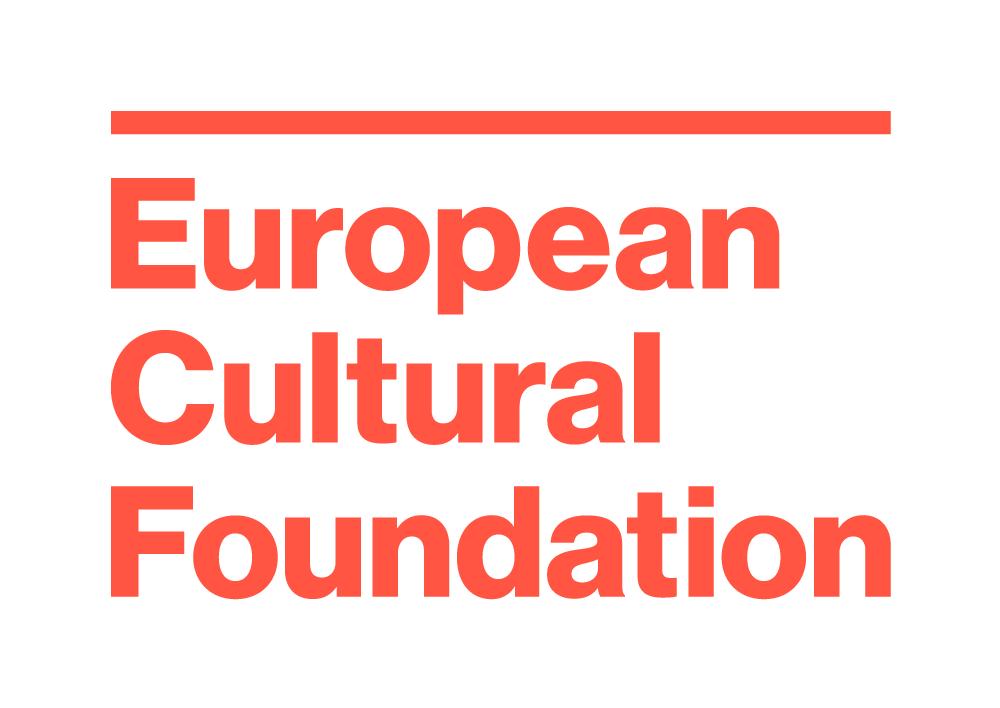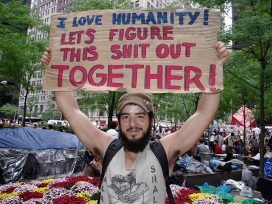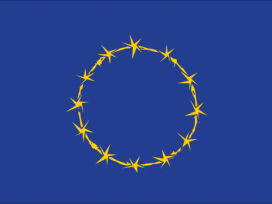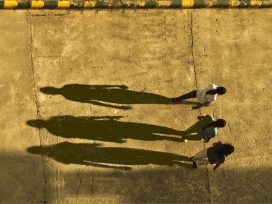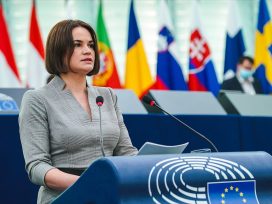Hannah Arendt once remarked that the rights of man proved to be unenforceable in postwar Europe. Currently, observes Valeria Korablyova, the refugee crisis looks like proving the idea of Europe itself to be unenforceable. So what will remain if equality and solidarity finally fail to become the principles of cooperation between EU member states now riven by common fears?
The refugee crisis burst onto the scene in Europe this year in a way that surprised many. Paradoxically enough, the influx of refugees – manageable in terms of numbers and existing facilities – activated a chain of serious consequences. It challenged not only the effectiveness of the European Union’s institutional structure but also the viability of the European project itself. The lack of trust between member states, the division between “Old” and “New” Europe that had never ceased to exist, the absence of shared EU policies and strategies: this is to name but a few sensitive issues that the crisis exposed. As Hannah Arendt once remarked:
The Rights of Man, supposedly inalienable, proved to be unenforceable …1
It looks like the idea of Europe too, and the European values implied, also turn out to be unenforceable. The tricky point here is that any forced imposition of values would undermine the cornerstones of “Europe” as an inclusive project based on freedom and the recognition of sovereignty.
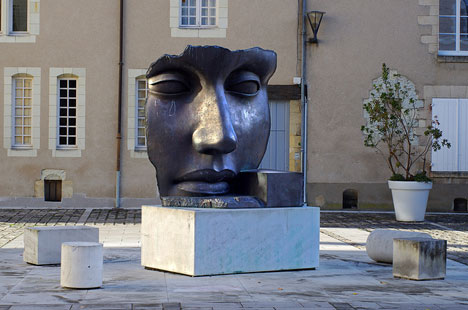
Per Adriano, bronze sculpture by the sculptor Igor Mitoraj, in Angers (Maine-et-Loire). Photo: Daniel Jolivet. Source: Flickr
It would be an exaggeration to say that the current crisis has set the EU on a course that risks leading to its dismantlement. However, the crisis certainly served as a trigger that brought hidden problems and controversies to the fore. Whereas the case of Greece or the annexation of Crimea prompted recourse to economic measures, concrete reforms or sanctions, the current crisis persistently evades proposals of practical steps toward resolution, let alone the realization of such steps or even any form of crisis management. Notwithstanding a degree of success in coping with certain immediate situations, largely restricted to the local level, hysteria and alarmism continue to thrive. Thus there arises an urgent need to confront the fears that surround the practical situation. To this end, I’d like to return to some further ideas of Hannah Arendt’s.
The refugee crisis and the clash of modern utopias
Hannah Arendt reveals a major controversy at the core of modernity, between the universalist claim of the Rights of Man and the utopia of nation-state sovereignty that celebrates the particular. To put it more simply, if one recognizes the autonomy of the nation-state, then no supranational standards or policies can be imposed, human rights included. Moreover, modernity itself, as realized in practice, is restricted to the world of nation-states. As Michael Billig points out:
Nationhood, spreading from Europe to the Americas and elsewhere, was established as the universal form of sovereignty. The world’s entire land surface, with the exception of Antarctica, is “now divided between nations and states”.2
The nation-state is the main institution defining and upholding rights. The system of international law is built to synchronize various national legal systems on supposedly common grounds.
Here, another modern utopia should be mentioned, that is the utopia of the EU as a supranational institution of the shared sovereignty of nation-states. What does co-sovereignty mean in terms of the nation-states’ autonomy? Timothy Snyder stresses that, from the very beginning, the EU project has always been about the shift from empires to nation-states. However, he’s far from being an optimist about the actual sovereignty of nation-states being “propped up” to endure.
Snyder claims that initially the EU emerged to compensate colonial losses of the former naval-powers. They were forced to stick together to strengthen each other, thus creating a geopolitically significant power. A real turning point was 1989, when there commenced a process of unifying former metropolises and colonies on arguably equal grounds. It led to the present configuration of the EU as a supranational structure supporting small nation-states without significant assimilation and oppression.3 It has been working more or less smoothly till the moment of a supposed controversy between national and European interests.
Nowadays we observe a strange situation where, due to a lack of trust, every party considers itself to be a donor from which the others benefit. The rhetoric of European values is perceived only as a smokescreen; herewith the defence of “national interests” is justified as the only way to preserve oneself. Ironically, the outcome will most likely be the opposite. Adherence to the national as opposed to the European will weaken the EU as an umbrella organization protecting small nation-states, which will eventually have to fall back on geopolitical structures that are dependent on great powers.
Tricky human rights
Since rights are guaranteed and maintained by the state, being stateless means being rightless. As Hannah Arendt reveals in the Origins of Totalitarianism, the Nazi regime first violated the civil rights of Jews to see if any state would claim them.4 Here, depriving a people of a state was a prerequisite to physical extermination: losing citizenship, a person ceases to exist in the political world. Human rights make no difference in this context:
The prolongation of [forced migrants’] lives is due to charity and not to right, for no law exists which could force the nations to feed them; their freedom of movement, if they have it at all, gives them no right to residence which even the jailed criminal enjoys as a matter of course; and their freedom of opinion is a fool’s freedom, for nothing they think matters anyhow.5
From this standpoint, the migrant is reduced to a living being who for the most part merely deserves compassion. Here, in terms of agency, refugees stand equal to other objects such as animals (not to be treated severely) or the environment (to be preserved for the sake of humanity’s future). Likewise, we celebrate our humanity by volunteering time and resources for the refugees. And it leaves no room for their agency. In constraining the issues at play to biological survival, we suspend the civicism of refugees. All the camps with food and blankets are by no means sufficient for the task at hand, and they fix asymmetrical relations with refugees as living beings, excluded both physically and symbolically from the political space of our societies.
In the modern world of nation-states, civil rights are more fundamental than human rights: only becoming a member of a political community enables one to participate in social life. So, what’s the political niche for newcomers in Europe? Are they supposed to surrender (accept biological existence as being adequate), or assimilate (to become politically indistinguishable), or be represented as a particular political community within diverse European society?
These issues have yet to be addressed. And one should keep in mind that by rejecting newcomers as members of our community, we might push them to arrange other communities that are potentially hostile to ours. While refugees observe other people realizing their political agency in an environment specifically geared toward this end, it is only a matter of time before the same refugees claim their political rights. And if political structures as they stand don’t offer them any legal possibility to do so, one can guess the consequences.
“Old” Europe: Social contract at stake
The main obstacle to the political recognition of refugees as new members of our societies is fear. First and foremost, the fear of losing political and cultural cohesion. Yet different issues are stressed in different parts of Europe. The distinction between “Old” (western) and “New” (central) Europe is crucial in this context, as a basis for understanding the historical and psychological aspects of ongoing processes.
For Old Europe, the nation is a political community built on a social contract. And the main threat coming from migrants and refugees concerns their unwillingness to recognize this contract, an unwillingness that might ultimately change the whole environment. People driven by economic motives or threats to their life arrive in prosperous societies striving for a better life without accepting social and political norms that residents take for granted. France is the most topical example here, being the exemplary political nation-state that disregards the ethnic aspect while pushing certain principles of common living as undisputable. It has accepted many migrants over the last decades, and from the very beginning it was not cultural homogeneity that was the core issue but the principle of laïcité. From the origins of the French modern state, religion was constrained to the private domain, whereas in the public sphere, discussions (and even mockery) of religion were totally acceptable. This approach met with huge opposition from the side of Muslim newcomers, who did not want to give up on displaying their sense of religious belonging publicly and treated jokes about the issue as a serious insult.
The Charlie Hebdo attack caused an uneasy discussion worldwide about whether France should switch from the assimilative model (subordinating cultural particularities to hegemonic political principles) to a multiculturalist approach perhaps modelled along US lines. Yet, for France it seems to be a matter not of tolerance (as it is often represented to be) but of the legacy of the French revolution and the Enlightenment as the cornerstones of the French nation. And the country is targeted again and again, with the recent terrorist attacks on 13 November in Paris being aimed precisely at this legacy. We should keep in mind however that the rise of the Right throughout Europe destroys this very legacy even more effectively, thus completing the terrorists’ job for them.
Of course, western Europe is not homogenous in this regard: most countries around the world are paying far more attention to ethnic and cultural issues but treating religion in a different fashion. Yet the link between the influx of refugees and the rise of terrorism, now visually supported by the images from Paris and most recently Brussels, definitely embodies the common European fear. The underlying assumption here is that the number of migrants is critical: whereas Europe is able to integrate quite effectively a relatively small number of newcomers, big numbers will potentially lead to their segregation, such that they become communities that are almost completely alien to the host countries. But can the problem really be conceived of principally in quantitative terms? Could it be that Europe has lost its “innocent provinciality”, having discovered the diverse world that exists beyond European borders? Must all the policies previously elaborated within the horizons of Europe be revised from a global perspective?
Parvenus of New Europe: The fear of reverse discrimination
At first glance, the danger posed by the loss of homogeneity applies all the more to Central and Eastern Europe, which is much more culturally monotonous, so to speak. Indeed, these societies have a very restricted experience of cultural diversity6 and therefore lack established practices of integration or assimilation. People perceive their community not only in political terms but also through the lens of ethnicity, culture and religion. Against this backdrop, migrants are harder to tolerate and to assimilate. Yet, it’s not the only reason.
The deeper fear concerns the lack of confidence in their own “Europeanness”. Despite claims of equality among EU member states, many of the countries in question have been made to feel like European pariahs that fail to meet requirements and face the permanent challenge of catching up.7
This psychological mechanism can be described using the notion of the “parvenu”: upon having finally become part of a desired community, the former pariah strives to distance itself from less fortunate subjects. And any newly arrived pariah potentially challenges the fragile order. If the number of pariahs becomes intolerable then the community becomes more closed, and former pariahs can also be discovered and rejected.
In other words, the countries of New Europe have an anxiety about their own prospects within the Union. They have been trying too long and too hard to become a part of the world of prosperity, and newcomers pose a threat to their achievements. The only way to persist therefore is to distance oneself from people with a similar background (“victims”) and identify with “masters”, or the “rulers” of the desired world. (Not surprisingly, former migrants in Old Europe show the highest level of intolerance towards today’s refugees).
From this perspective, it becomes obvious that any push for “quotas” or for the fulfilment of “obligations” before the EU only stresses the existing hierarchy within the Union, where some member-states have the right to force the others to get certain things done. This is proof of the “second-rate Europeanness” of New Europe, which is expected to surrender rather than negotiate. Therefore the only way to affirm their agency is to resist, that is to defend their symbolic and physical space.
So, for Central and Eastern Europe it’s the fear of reverse othering: countries that have experienced discrimination and are anxious about being othered once again.
Beyond which, there are yet more questions to be resolved: does New Europe really share Old Europe’s social contract? And do the declared European values correspond to the central European version of the social contract, or must they be revised accordingly?
A plausible way out of this dead end is to transform equality and solidarity as mere rhetorical devices into the real principles of cooperation between EU member states. An alternative option that now seems very likely is to transform the EU into a closed club where strict internal subordination reigns. I’m confident that not only will this option discredit the idea of the EU as a post-empire entity of co-sovereign nation-states but it will also reinforce internal borders. So the ultimate question arises: what precisely do we choose to preserve under the “Europe” brand?
Hannah Arendt, "The decline of the nation-state and the end of the Rights of Man", in Hannah Arendt's The Origins of Totalitarianism, A Harvest Book, 1979, 293
Michael Billig, Banal Nationalism, Sage Publications, 1995, 22
Timothy Snyder, "Ukraine, Russia, and Europe, past and future I" (Modern European history: A global framework from eastern experience), IWM lecture in human science, 16 June 2015, www.iwm.at/events/event/ukraine-russia-and-europe-past-and-future-i/
Arendt, "The decline", 296
Ibid.
For more on which, see Andre Liebich, "Central Europe and the refugees", Tr@nsit Online, 2 November 2015, www.iwm.at/read-listen-watch/transit-online/central-europe-refugees/
Which formed a special framework of victimhood, as Slavenca Draculic reveals in "Competing for victimhood: Why eastern Europe says no to refugees", Eurozine, eurozine.com/articles/2015-11-04-drakulic-en.html
Published 26 November 2015
Original in English
First published by Eurozine
© Valeria Korablyova / Eurozine
PDF/PRINTIn collaboration with
In focal points
- Disintegration or revival?
- Mobilizing law for solidarity
- Solidarity after Machiavelli: An interview with Ira Katznelson
- Liberalism, populism and the challenges of post-transformation in eastern Europe and beyond
- The limits of solidarity
- On the borders of solidarity
- The crisis of neoliberalism in Europe
- Utopian dreams beyond the border
- The politics of nature in the Anthropocene
- Strangers when we meet: Identity and solidarity
Newsletter
Subscribe to know what’s worth thinking about.
Related Articles

Conflict, commitment and fear
Post-Soviet migrants in Germany and war in Ukraine
War polarizes debate. And the sympathies of post-Soviet migrants living in Central Europe have come under extra scrutiny since war broke out in Ukraine. A closer look at the immigrant demographic in Germany reveals a more complicated picture of suspected Russophilia.
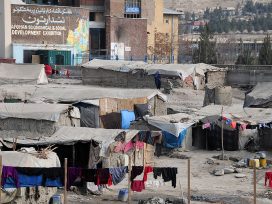
Life as death
How Afghan refugees aren’t offered real solutions
More than half a million Afghans were displaced in 2021, adding to many more forced to flee over decades of uninterrupted violence. But offers to accommodate Afghanistan’s ‘living dead’ are often conditional on obscure definitions of neediness.
